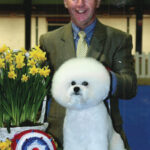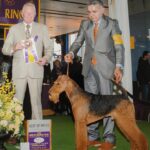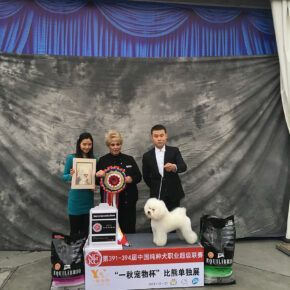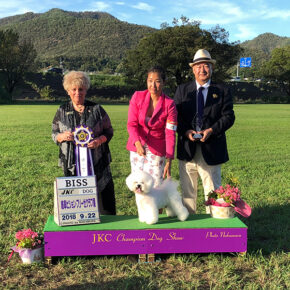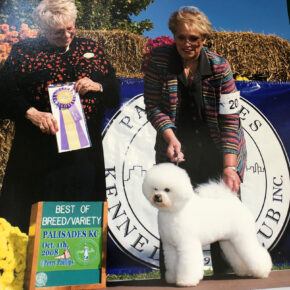Judges Choice
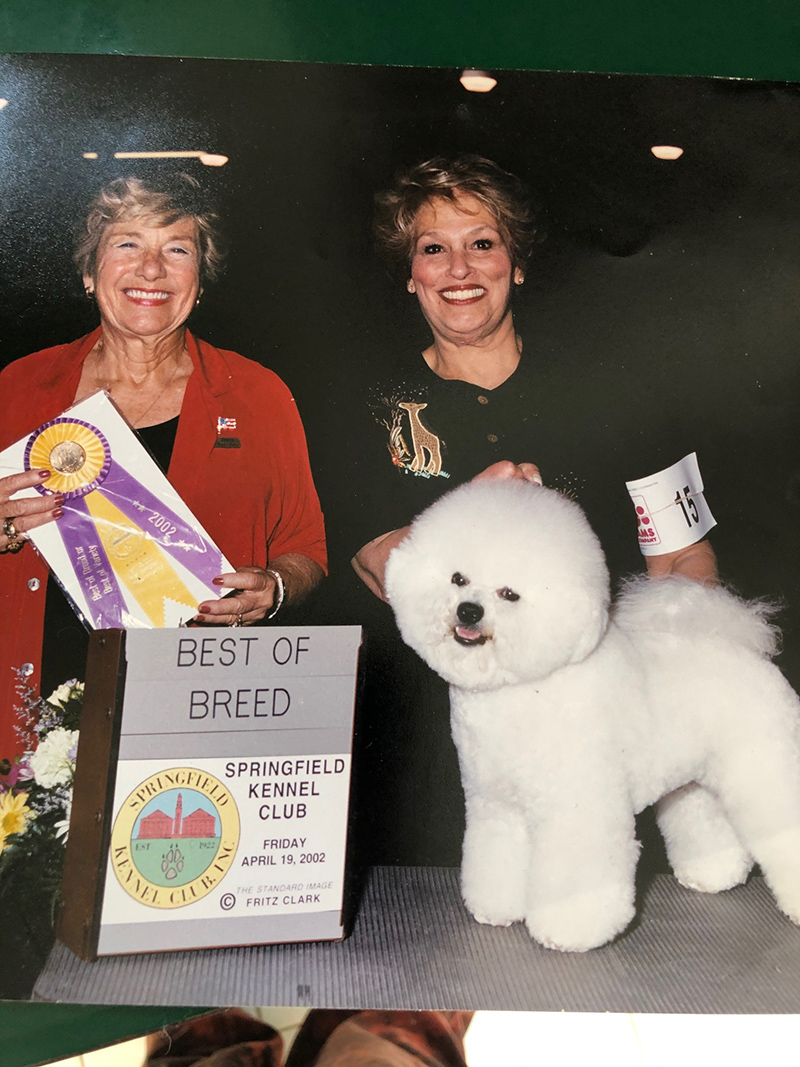
Q: Please tell us, how did you get involved in dogs? How did you start with Bichons? What is the story behind your kennel and your kennel name?
A: My name is Mimi Winkler, and I have been involved in the wonderful world of purebred dogs for over thirty years. My involvement and how I started is rather unique. I have been a gymnastic judge since the late 70’s and was privileged to judge in Europe on a few occasions. While sitting at a cafe in Cologne, Germany I noticed a woman walking three adorable white dogs and asked her the breed. “Bichon Frise,” she said. I think that I drove her crazy asking questions–half in German and half in English. When I returned to the states there was a local dog show where I found the Bichons, who were groomed so completely different that I almost did not recognize them.
Q: Where did your first dogs come from?
A: The breeder I met was Doris Hyde of Dove Cote Bichons and it was she who suggested my kennel name knowing I was a gymnastic judge. “Judges Choice,” she said, and I loved it. I named the bitch that I bought from her Dove Cote Judges Choice aka Muffy.
Q: Which dog do you consider the foundation of your own breeding?
A: I feel a bitch is most important in a good breeding program. I would say the bitch from my first ever breeding played such an important role. Ch. Judges Choice Purple Rain “Pumpkin” gave our Bichons body, leg, more elegance, and that special twinkle in her eye that has been stamped into every generation.
My foundation bitch and foundation dog were related. My bitches’ father was my dogs’ grandfather. I like to do research and ask questions of highly successful breeders to garner as much knowledge as I can when venturing into something new. Over the years I have gone out of my line but have only bred to tightly line bred dogs. Breeding to the flavor of the month has never been my style nor has buying dogs from all over the world with no common ancestors at all.
Q: What kind of selection do you prefer in your breeding program line breeding, inbreeding or an outcross?
A: When you are honest in your evaluation of your breeding program, when you know your dogs, their strengths, and weaknesses, and have done all the health tests you can do inbreeding safely. Line breeding is the most comfortable avenue for me. Knowing the dogs in the pedigree makes it easier for me to plan the next generation.
There are times when there is a need for different strengths and a different bloodline, so an outcross is needed. But that dog must be tightly linebred. I will only use a dog from a breeder who cares as much about their line as I do mine.
Q: What would you say was your greatest achievement as a breeder so far?
A: I guess most would say my biggest accomplishment has been that I am the breeding program behind JR BIS Winner of Westminster Kennel Club in 2001. I bred his mother, his grandmother, his great grandmother and on back to Pumpkin. I would say my biggest accomplishment is breeding healthy, happy dogs that bring joy and love to their owners.
Q: Which attributes are your priorities when breeding the Bichon?
A: When I am planning a breeding, I list the strengths and weaknesses of my bitch. I want a stud that will compliment her. In addition to my priorities of movement, temperament, coat, pigment, tail set, and of course type I might look for better shoulder layback if I felt that was what my bitch needed. Each breeding is different of course, but the want for a perfect Bichon is always the goal.
Q: What three qualities do you think are the most important when you look at a Bichon?
A: Type, balance, and movement.
Q: Which faults would you not tolerate in your breed?
A: There are things you can forgive and things you cannot. I do not want aggression or lack of confidence. We each have personal peccadillos and mine are too much white of eye, lack of pigment, and low tail sets.
Q: How has the breed changed over the years? Would you say it has gone to better or worse?
A: If you loved this breed when they were longer, with less leg, and ears and beards almost down to the ground then you would be disappointed in the style of today. Yes, we have evolved. We are more up on leg, with more neck, more elegance, and certainly more style. Do we need to work on better fronts, better rears, better pigment, stronger chins, better tail sets? Of course, we do. But doesn’t every breed if we want perfection.
Q: Can you describe an ideal Bichon?
A: My ideal Bichon gives me chills when it walks into my ring or runs around my house. Type, type, type, with black pigment, eyes that penetrate your soul, tail over its back, gliding in free movement, extension through the neck, all the while saying ”I am having the time of my life.”
Q: Please name 3 your all-time favorite winners bred by you and 3 not owner nor bred by you.
A: Three dogs bred or owned by me; Ch. Judges Choice High Ridge Right On ROMX, Ch. Dreams Came True Jennifer ROMX, and Ch. Judges Choice Diamond Jim ROM. Dogs not owned by me; Ch. Tauro Misoko, Ch. Special Times Just Right ROMX, and Gr,Ch.Wendans Because I’m Happy.
Q: What homebred dog of yours comes closest to your ideal?
A: Reno, Ch. Judges Choice High Ridge Right On ROMX. He had type, balance, attitude, heart, and soul. He never let himself down. He never let me down ever.
Q: Which breed would you have if you did not have Bichons?
A: I would have German Shorthair Pointers–love them and miss them.
Q: What advice would you give to a new person in the breed?
A: Do not be a collector, do not breed to the flavor of the month. Learn how to establish a line, to read pedigrees, learn genotype, learn phenotype, and structure. Be honest in your evaluation of your dogs. Ask questions to old time breeders and listen. Soak up their knowledge. I have bred 93 Bichon Frise champions so far. I accomplished this because I listened.


